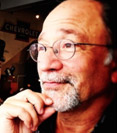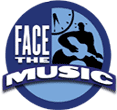CONNECTING THE DOTS

I remember, as a small child, playing a game called "Connect the Dots."
In front of me was an activities book composed of sheets of paper with nothing on them but numbered dots. My task was a simple one -- to draw lines between the dots, connecting each dot sequentially. #1 would get connected to #2. #2 would get connected to #3 and so on until each of the dots were connected, resulting in the creation of some kind of picture -- a hat, a house, a boat, or whatever the book publisher had in mind.
I found this fascinating, thrilled that I could make something, that out of nothing something would emerge -- something I could recognize, name, and later, talk about.
And while I did not grow up to become an artist, I did develop an interest in the phenomenon of pattern recognition, pattern making, and the various ways in which human beings construct their own reality.
As I got older, it became clear to me that this same children's game of connecting the dots had played itself out, in human history, in many fascinating ways. What were the constellations, if not bigger kids -- the ancient Greeks and Babylonians -- connecting non-numbered dots in the night sky -- the product of their need to make sense out of what they saw.

And so Orion, Canis Major, the Big Dipper, and 84 other configurations of stars came into being -- points of light that were clustered and named by the earth's first farmers as a way to help them figure out when to plant and when to harvest.
And to help them remember the constellations they had configured, the farmers made up myths -- wild stories to remind them of the patterns in the sky so they could pass on what they had discovered to next generation.
But it wasn't only farmers who benefited from this connect-the-dots myth-making phenomenon. Ancient sailors did, too, adventurers whose long journeys across unchartered waters were navigated by watching man-made constellations in the skies to mark their position.
This is what human beings do. We connect the dots. We make patterns. And then we translate what we see into stories as a way to remember and communicate to others what we have conjured.
That's what stories are. First there is a point -- an isolated moment in time and space when something becomes perceivable -- a leaf falling, perhaps, a dog barking, a thief, a speck of light.
In and of itself, this perceptible thing is just an isolated dot. In the first instant when it becomes known to the observer, it is freestanding, independent, and unrelated to anything else in the universe. It is not connected to the past or the future. It is not the beginning of something or the end of something. There is no plot, no unfolding of events, no Act One, Scene Two. No nothing.
It just is.
But soon the story-making part of ourselves kicks in -- the constellation maker.
Ruled by a primal need for meaning and knowing, it begins to connect the dots, to make sense of what it sees. It draws invisible lines through time and space until it sees a picture in its mind, a recognizable shape that helps make sense of experience.
Standing beneath the infinite sky of possibilities, this innate pattern-making tendency brings orientation, comfort, and a newfound ability to communicate our subjective experience to others.
Some become movies. Some become books. Some become jokes. Some are told around the kitchen table or never at all.
Perhaps the most dramatic example of this is the phenomenon of creation myths -- the symbolic narratives of how the world began and how people first came to inhabit it. Every culture has their own -- elaborate cosmological stories with plots, sub-plots, characters, settings, obstacles and, more often than not, a whole bunch of deities.
Deconstruct any scripture or holy book and you will discover that its DNA is story -- parables, allegories, and tales that have become the human shorthand for delivering meaningful, memorable messages upon which we base our lives.
Now, here's where it gets really interesting. When the dots are numbered, and we proceed to connect them in the same, sequential progression, we always arrive at the same picture -- conclusions that everyone can agree on.
But when the dots are not numbered and the dot connectors (that's us, folks) realize we have a choice about how we connect the dots and whether to make the lines wiggly, wavy, bold, invisible, or straight, a very different picture emerges and a very different story gets told.
The simplest example of this is a husband and wife arguing.
While the same dots may be marked on the paper (or in the sky), the way in which the husband and wife connect the dots is very different, resulting in two very different and, often, conflicting stories. He sees it one way. She sees it the other. The result? The plot of many a modern day sitcom and a 50% divorce rate.
This phenomenon plays out on many other stages, as well. The Israelis, for example, connect the dots differently than the Palestinians. Virgos connect the dots differently than Leos. And the Native Americans connect the dots differently than America's Founding Fathers.
Psychologists attribute our dot connecting behavior to a cognitive principle they have reduced to three words: Motivation affects perception.
In other words, we see, they say, what we are primed to see, filtered through our need or desire of the moment -- a phenomenon which Eastern pundits have translated in their own, more metaphorical way, "When a pickpocket meets a saint, all he sees are pockets."
Done well, storytelling is a force for good, an extraordinary way to energize, inspire, and transmit wisdom. Abused, storytelling has an entirely different result.
Con artists, for example, tell believable stories, but only with the intention to deceive. The same holds true for corrupt politicians, spin doctors, cheating spouses, warmongers, the sensationalist media, gossipers, most of the advertising world, and anyone else attempting to bend the truth for their own personal gain.
The fact that human beings are story-making machines is undebatable. From the first Paleolithic cave paintings to the latest Hollywood blockbuster, that's what we do.
What's up for grabs is this: the kind of stories we choose to tell.
Storytelling for the Revolution
MitchDitkoff.com
Child on ladder photo: Samuel Zeller
Night sky photo; Clint McKoy
Posted by Mitch Ditkoff at 05:41 PM | Comments (1)
October 10, 2022Why Tell Stories?
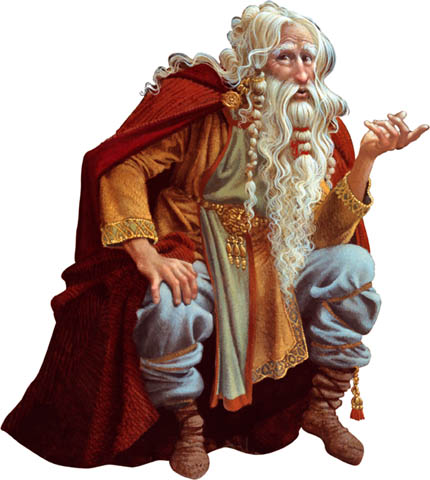
In the last 60 seconds, here's what happened:
168 million emails were sent, 700,000 Google searches were launched, and 60 hours of YouTube videos were uploaded, not to mention all the spam, banner ads, phone calls, Facebook posts, tweets, texts, and telemarketing calls that found their way to your doorstep.
A whopping 90% of all data in the world has been generated in the past two years alone. Think about this: Before the dawn of civilization, approximately 5 exabytes of information had been created. Now, that much information is created every two days!
The common term for this head-spinning phenomenon is "information overload" -- the inability to absorb and process all of the information we are exposed to.
And while the gory statistics change every nanosecond, the results are the same -- leading to what is increasingly being referred to as "Information Fatigue Syndrome" (IFS) -- a condition whose symptoms include poor concentration, depression, burnout, hostility, compulsive checking of social media, and falling into trance-like states.

This describes the mindset of many, if not all, of the people you are attempting to influence on a day-to-day basis, be they customers, clients, friends, voters, volunteers, children, or your mother-in-law.
If you are committed to delivering a meaningful, memorable message to another human being, the burning question you need to be asking is this: "How can I cut through all of the background noise so my message can heard and remembered?"
Fear not. It's possible. According to neuroscientists, psychologists, theologians, sociologists, advertisers, linguists, and marketers, the answer is a simple one: storytelling.
Storytelling is the most effective, time-tested way to transmit meaning from one human being to another. It's been going on since the beginning of time when our first ancestors stood around the tribal fire. It's how civilizations pass on their wisdom to the next generation. It's how religions pass on the sacred teachings of their faith. And it's how parents, via the telling of fairy tales, transmit the values they want to impart to their children.
Here are just a few of the reasons why storytelling is so powerful:
It quickly establishes trust and connection between the speaker and listener.
It increases receptivity, captures attention, engages emotions, and allows the receiver to participate, cognitively, in the narrative.
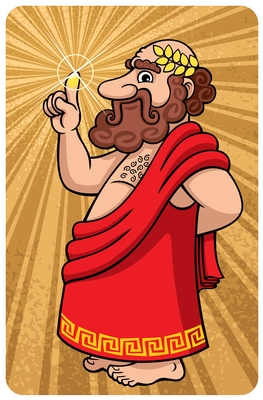
It communicates values, not just skills, decreases teaching time, builds community, ignites five more regions of the brain than mere fact giving, helps people make sense of their world, shapes perceptions via the subconscious mind, reframes frustration, paradox, and suffering, changes behavior, and provides a dependable way for people to remember, retrieve, and retell a meaningful message.
Think about a message you want to communicate to someone today. How might you do that via story, instead of overloading them with more information, statistics, and pep talks?
Excerpted from Storytelling at Work
My newly launched storytelling blog
PODCAST: Storytelling at Work
Posted by Mitch Ditkoff at 11:39 PM | Comments (0)
September 07, 2021You Are a Universe of Stories

Astronomers, in 1996, attempted a very interesting experiment. They pointed the most powerful telescope in the world, the Hubble space telescope, into a part of the sky that seemed to be completely empty, a patch of the universe long assumed to be devoid of even single planet or star. This experiment was a somewhat risky one, since time on the Hubble telescope was quite expensive and in very high demand. Indeed, there were many highly respected scientists, at the time, who questioned whether "looking at nothing" was a wise use of time and resources. Nevertheless, the experiment proceeded.
When the lens of the telescope was finally closed, 10 days later, and the images from deep space were processed, more than 3,000 galaxies had been detected, each galaxy containing hundreds of billions of stars.
Eight years later, in 2004, astronomers decided to perform the experiment again, this time pointing the Hubble telescope towards a different patch of sky -- a section of the universe also assumed to be completely empty.

At the end of this second experiment, using advanced detectors and filters that allowed more light through than ever before, 10,000 new galaxies were discovered -- each one also containing billions of stars.
As a writer and storyteller, I have asked many people to tell me their stories -- moments of truth in their life... or rites of passage.. or just something interesting that happened to them. Not infrequently, the people I ask look back at me with a blank stare, explaining, in various ways, that they really don't have any stories to share -- that not all that much interesting has happened to them in their life.
Metaphorically speaking, I am directing their attention to a patch of their own night sky and what I hear back from them is that there is nothing there. To them, it is empty.
As a long-time researcher into the storytelling phenomenon, I know their conclusion is not even remotely close to being true. Each and everyone of us, no matter where we were born or what our life experiences have been, contain a universe of stories within us: Memorable happenings... moments of truth... rites of passages... unforgettable encounters... lessons learned... cool experiences ... and a whole bunch of off the grid moments -- small, medium, and large.
And yet, when we are asked to identify our stories, we often draw a blank -- not unlike those skeptical astronomers who assumed there was nothing to see in deep space.
You have stories. You do. Of course, you have stories! If your life depended on it, you could identify at least ten of them in the next few minutes. And if I offered you a thousand dollars, you could come up with a whole lot more.
Why then, are so many of us blind to our stories? Why do so many of us insist there is nothing much to see or say?
Three reasons: First, most of us assume that a story needs to be earth-shattering in order for someone else to be interested enough to listen to it, and because most of our stories are not earth-shattering, we forget them quickly or never see them in the first place. Second, we just don't take the time. Remember, the astronomers who pointed the Hubble Telescope into deep space did it for 10 days, not 10 minutes. And third, most people don't know where to look or how to look. The "technology" we use to detect and unpack our own stories is not very sophisticated.
Consider this: If you look into the night sky with only your own two eyes, the most you are going to see, on a good night, is 3,000 stars. There is no way you will be able to detect that the universe is actually 47 billion light years wide with an estimated 100 trillion galaxies, each galaxy containing hundreds of billions stars.
You and I, my friend, are also universes. We are. Inside of each of us are 7 billion billion billion atoms. That's a one with 27 zeros after it. And while we might not have 7 billion billion billion stories inside us, we certainly have more than a few, each one capable of lighting up the night sky. And not just for our own selves, but also for the fortunate ones who get a chance to listen to them.
If you want to discover your stories (each one, by the way, encoded with its own special kind of light), you will need change the way you look for them. And, of course, before you even begin to look, just like our Hubble Telescope astronomer friends, you will need to become CURIOUS.
One way to identify your stories
Storytelling for the Revolution
Photo #1: Greg Rakozy, Unsplash
Photo #2: Jeremy Bishop, Unsplash
Posted by Mitch Ditkoff at 11:44 PM | Comments (0)
June 24, 2021Why Your Brain Likes a Good Story

Lucid, Harvard Business Review article on why your brain likes stories. Oxytocin anyone?
Storytelling at Work
Oxytocin-generating book excerpts
Posted by Mitch Ditkoff at 02:30 PM | Comments (0)
April 08, 2021On Reading an Audience
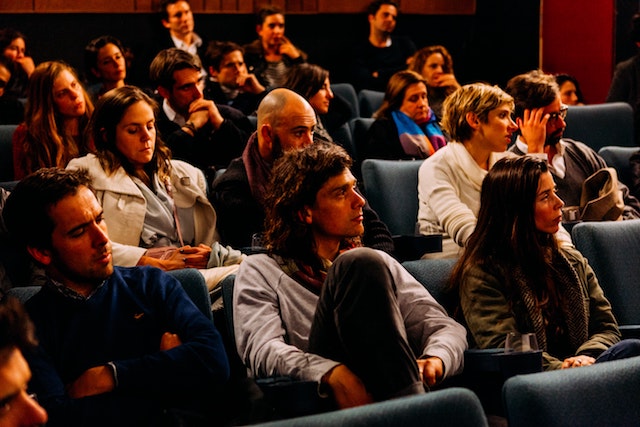
Astrologers read stars. Meteorologists read weather. Palm readers read palms. And storytellers? They read people. At least, good storytellers do. No matter how many times they have told a story, the way they tell it depends on the subtle cues they are picking up (or not) from their audience. Attuned to the signals their listeners are putting out, good storytellers adapt and adjust their delivery accordingly.
Simply put, storytelling is a lot like dancing. It is alive and dynamic. It is not a static art form, not a canned speech, not the repetition of memorized words. Rather, it is an in-the-moment expression designed to move people. And while it is true that, just like dancing, there are steps, patterns, and structures to be mindful of, the difference between a good story and a great story is often a function of the storyteller's ability to improvise.
How does this spontaneity happen? What is the responsive storyteller paying attention to in order to make the kind of subtle adjustments needed to ensure their story truly has impact?
In a phrase, the in-the-moment feedback being communicated by their listeners -- the subtle cues and signals their audience sends, whether it is one person across a kitchen table or a thousand people in an auditorium. The more the storyteller is able to sense this feedback and adapt, the more successful their storytelling becomes.

What kind of feedback are we talking about? Primarily, two kinds: facial expressions and body language -- the unspoken signals people put out that express their responsiveness (or lack thereof) to what they are seeing, hearing, and feeling.
Like head nods, for example. Like smiles and frowns. Like the way a person looks or doesn't look... or where they look... like the way a person leans forward or backward in their chair... or folds their arms.. or rolls their eyes... or grunts... or sneaks a glance at their cell phone.
All of it matters. All of it communicates its own story to the storyteller.
The more storytellers are able to pick up on these cues, the more they are able to adjust the dynamics of their delivery: How fast to talk, or how slow. Whether to pause, or not, and when. How dramatic to make their voice. When to move. When to be still. When to elaborate on a detail that has caught the audience's fancy. When to dig deeper into a specific plot point. And when to move on.
If you, as a storyteller, are nervous, self-absorbed, seeking approval, or impatient for the whole thing to be over, it will be very difficult to pick up on the signals coming your way. You won't truly be with your audience. While you may be physically inhabiting the same space, metaphysically you will be somewhere else -- off in your own world. Will real communication have taken place? Will the depth of the message you were hoping to convey have landed? Highly doubtful.
Words may have been spoken. Characters may have been introduced. Points may have been made. But the real story will have gone untold.
Excerpted from this book
Photo: Antenna on Unsplash
Posted by Mitch Ditkoff at 07:16 AM | Comments (0)
October 25, 2020What Stories Will You Tell Today?

Here's a story you can probably relate to: You are walking down the street when a friend, coming the other way, stops and asks "Whassup?" It's a question you've heard a thousand times before -- the default, open-ended salutation. Your choices are many. You can answer any way you want, from the predictable "Fine, whassup with you?" to an elaborate monologue on any number of topics: the weather, your vacation plans, the economy, the latest terrorist attack, local politics, your job, and the latest viral video.
In that moment, there is no correct answer. You get to decide what story to tell. What you don't get to decide is the impact your story will have. That's up to the listener. But know this: your story will have impact. Everything you say, everything you do has impact, even a seemingly casual moment of passing a friend on the street.
If you watch TV, you can see this phenomenon playing out daily. With an almost infinite number of topics to report on, the news TV reports on is mostly bad news: war, violence, political unrest, terrorism, famine, corruption, plane crashes, murder, scandal, disease, gossip, and unemployment with an occasional human interest story thrown in for good measure.
68% of Americans believe that TV news broadcasts focus way too much on bad news and yet we keep tuning in. The impact? Our state of well-being declines. We become sadder, more negative, more hopeless and depressed, exacerbating whatever personal worries and anxieties we already had before tuning in.

I'm not suggesting that news outlets airbrush the negative out of their reports. Nor am I suggesting they stop reporting on the bad stuff that's happening around the world. What I'm suggesting is that they find more of a middle path and make more of an effort to change the narrative to honor what's good and holy about being alive.
You and I are also news stations. You and I are also reporting on what's going on in the world. Like the TV executives behind the scenes, we also get to decide what stories to tell -- even on the street when a friend asks us "Whassup?" That is our moment of truth. That is our broadcast.
Will our stories be local versions of the nightly news, skewed to what's bad and wrong, full of gossip and complaint, or will we choose to tell a new story, one infused with possibility, progress, insight, awareness, and hope?
Storytelling for the Revolution
You are a universe of stories
Wisdom Circle Training
Posted by Mitch Ditkoff at 12:36 AM | Comments (0)
April 21, 2020Ten Great Storytelling Quotes


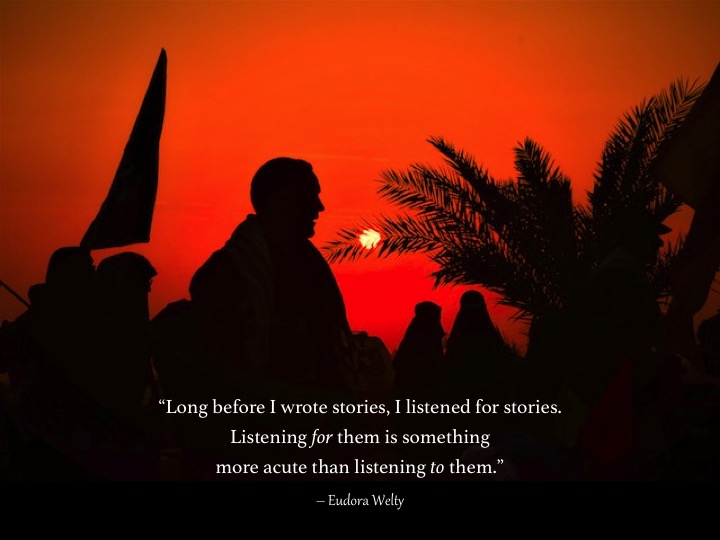
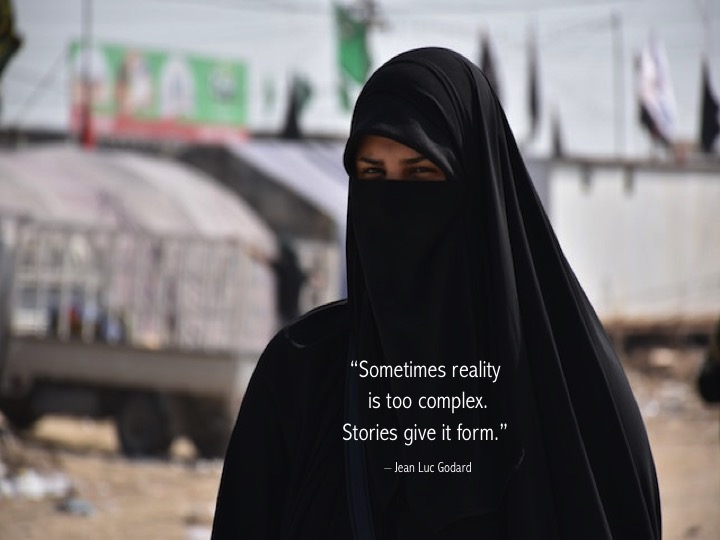
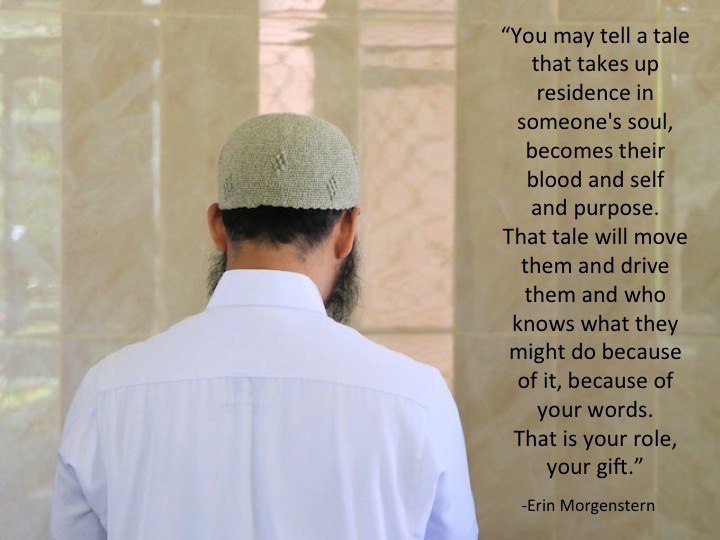

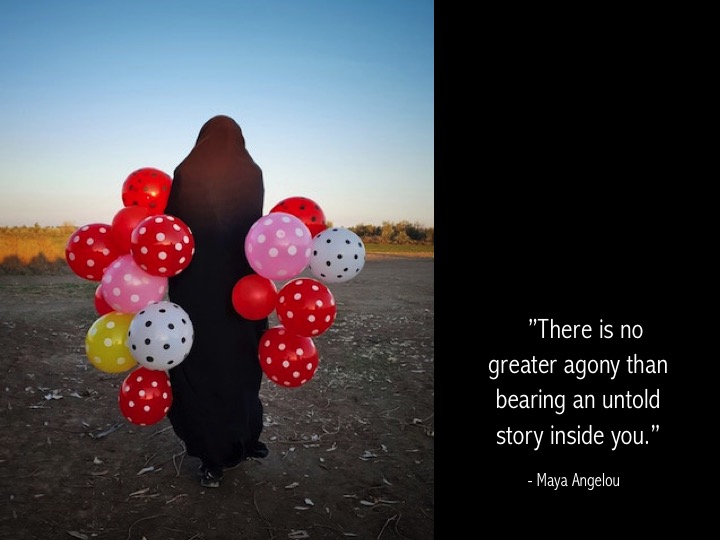 />
/>
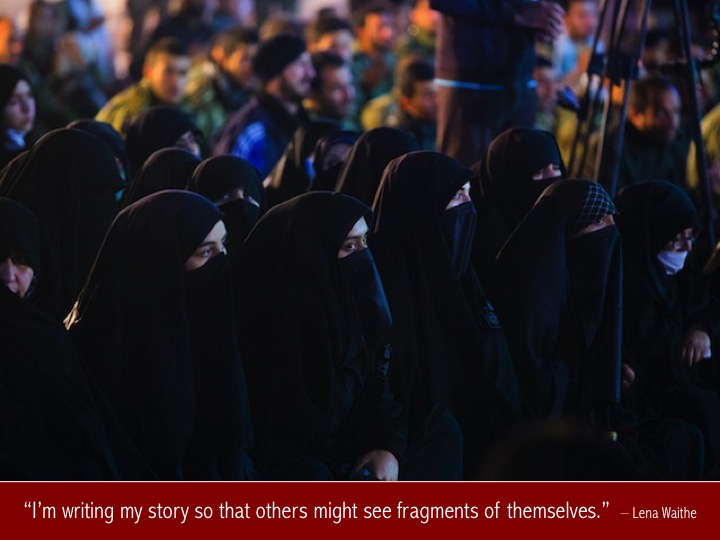
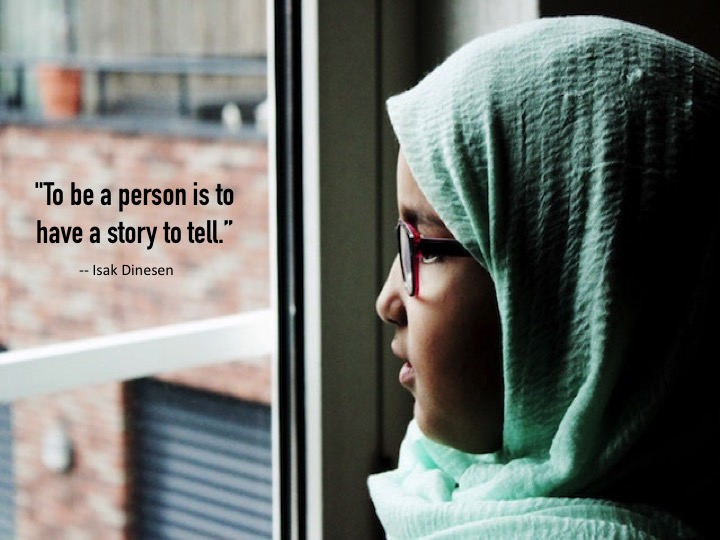

A Thousand Muslims and a Jew
The importance of family storytelling
Helping children understand the moral of story
Storytelling for the Revolution
Posted by Mitch Ditkoff at 11:02 AM | Comments (0)
January 31, 2020My Vision for Fostering a Revolution of Inspired Storytelling
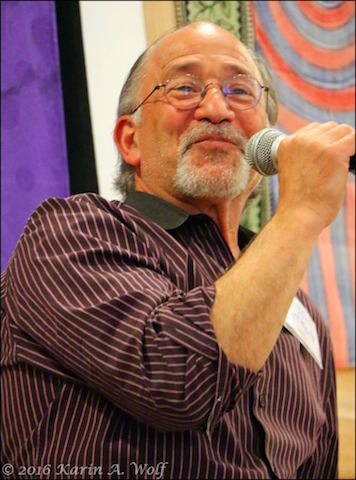
Although I have been deeply involved in the world of storytelling for the past eight years, I think it's fair to say that I am relatively new to the game.
Anthropologists tell us that oral storytelling emerged about the same time as language -- approximately 100,000 years ago. Based on my calculations, that puts me about 99,992 years late to the party. Oh well! Better late than never, eh?
That's one of the great things about storytelling. Done well, it helps people experience that which is beyond time. Not "out there" stuff only noted in holy books. But "in there" stuff, embedded within each and every one of us.
And this is precisely what's inspiring me, these days, about storytelling.
Storytelling is one of the simplest, most powerful ways to spark awareness, community, insight, wisdom, and behavior change. Indeed, that is why I wrote my new book, Storytelling for the Revolution and why I wrote my previous book, Storytelling at Work. It is also why I deliver keynotes, workshops, and Wisdom Circles.
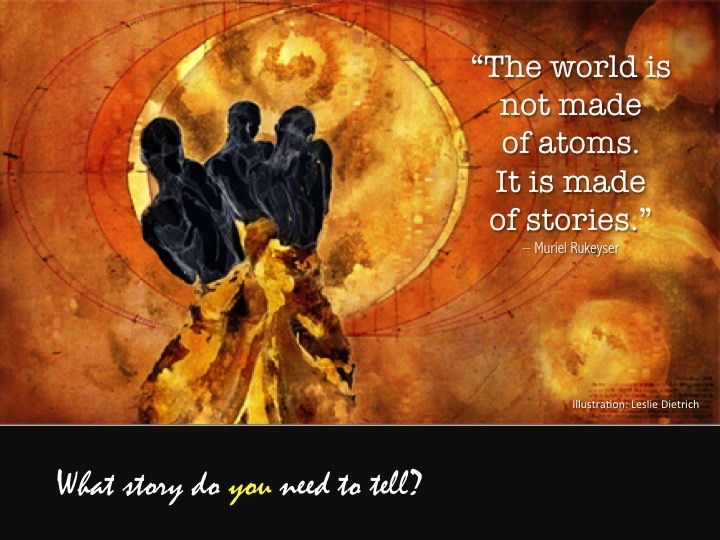
That being said, I am not just interested in selling books and getting a few good pay days. What is WAY more interesting to me, is sparking a revolution of meaningful storytelling on planet Earth -- the kind of storytelling that uplifts, inspires, and awakens -- a simple way to open minds, open hearts, and elevate the conversation.
Towards that end, I share with you, below, my current vision for how I intend to accomplish the above. If you see yourself plugging into this vision in any way, let me hear from you. I'm just an email way (mitch@ideachampions.com).
1. Facilitate Wisdom Circles -- a chance for people to share (and learn from) their most meaningful, memorable, personal stories -- and the stories of others.
1. Train Thousands of People How to Facilitate Wisdom Circles.
3. Teach and Empower Thousands of Youth Activists How to Use Storytelling as Way to Get Their Massage Out There (starting with this NGO)
4. Deliver Storytelling Keynotes and Workshops to forward thinking organizations
5. Get my two books on storytelling read by a million people. This one. And this one.
6. Publish my Storytelling for the Revolution audio book, so people can listen to my stories, not just read them. Here's an excerpt.
7. Develop a model for how schools can better integrate storytelling into their curriculum -- starting with Al Siraat in Australia.
8. Make it easy for thousands of aspiring storytellers to learn what it takes to have more impact
9. Choose to tell a life-enhancing story whenever the opportunity arises.
10. Continue publishing my storytelling blog -- a free resource for aspiring storytellers and wisdom keepers everywhere.
Want to connect? mitch@ideachampions.com
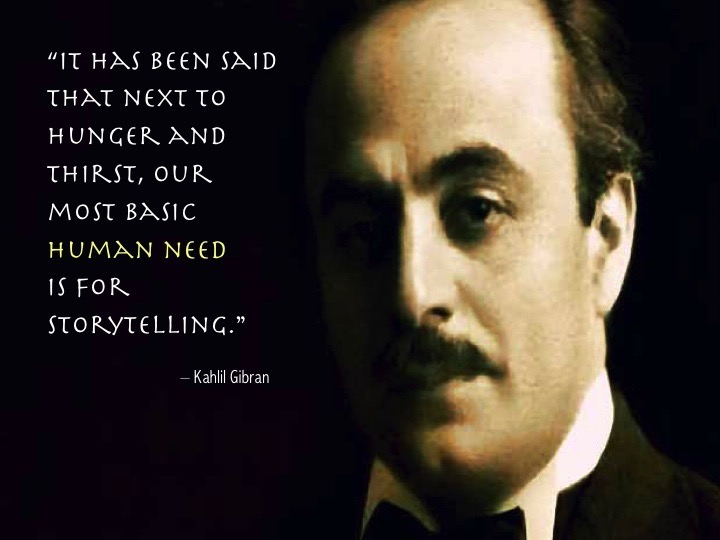
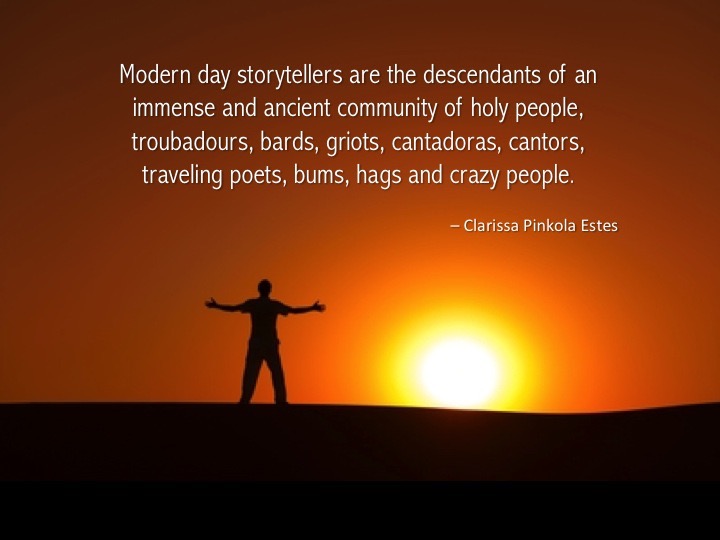

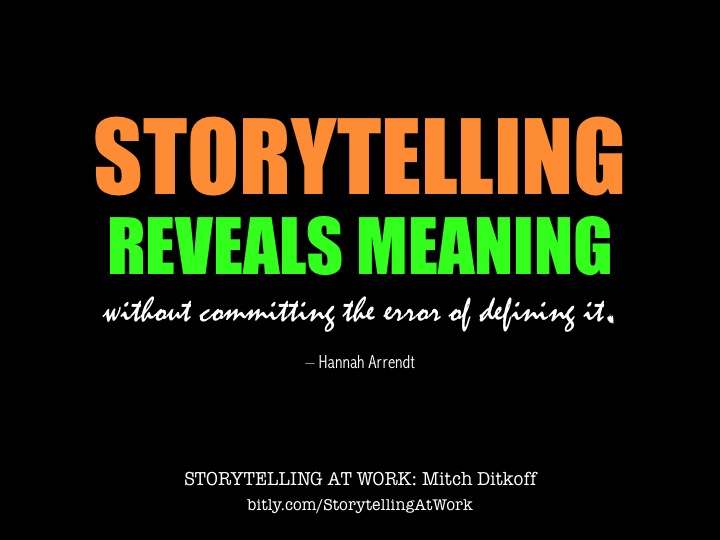

You have wisdom to share
MitchDitkoff.com
Posted by Mitch Ditkoff at 03:31 PM | Comments (0)
November 30, 2019A Picture's Worth 1,000 Words
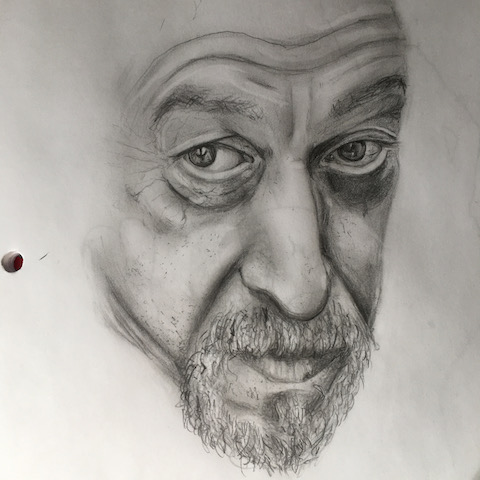
What story would you tell about this man? Drawing recently made by my super creative daughter, Mimi.
Posted by Mitch Ditkoff at 08:54 PM | Comments (0)
September 07, 2019Truly Tapping Into Potential
Big thanks to Dave Vinegrad, of Behaviour Matters, for the heads up!
Posted by Mitch Ditkoff at 04:57 AM | Comments (0)
August 14, 2019Storytelling for the Revolution Making a Big Splash in England
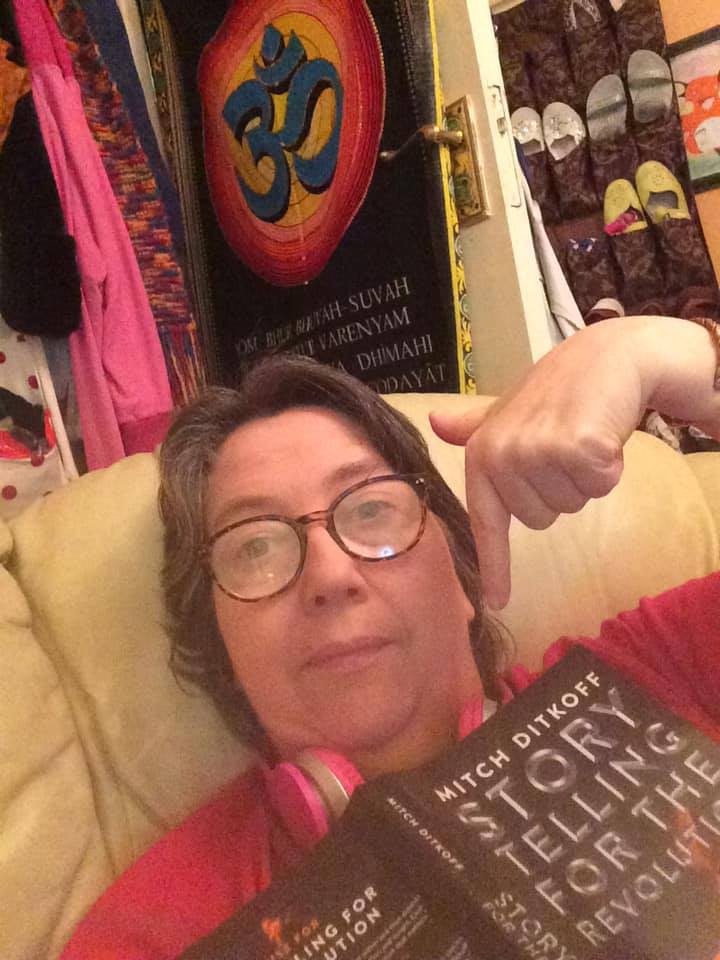
First there was Germany, now jolly old England. Seems like Storytelling for the Revolution's reach is going global, though two data points may be insufficient to reach that conclusion.
What you are looking at is the very noble, festive, creative, relaxed, kind-hearted, intrinsically motivated, poetic Juliet Whittaker reading my most recently published book -- which, apparently, is being enjoyed by lots of people here, there and everywhere, including these notables. If you haven't read it yet, click here to order from Amazon, either the downloadable Kindle version or the old school actual BOOK-IN-THE-HANDS version.
Storytelling for the Revolution
Storytelling at Work
The author
PS: Feel free to email me a photo of yourself reading my book. Who knows? Maybe YOU will be featured in a future blog post -- something to forward to someone you love OR someone who might benefit from reading my book. (mitch@ideachampions.com)
Posted by Mitch Ditkoff at 02:46 PM | Comments (0)
July 28, 2019The Power of Story in Politics
About George Monbiot
Storytelling for the Revolution
Posted by Mitch Ditkoff at 10:48 AM | Comments (0)
April 29, 2019WHAT PEOPLE ARE SAYING ABOUT MY NEW BOOK
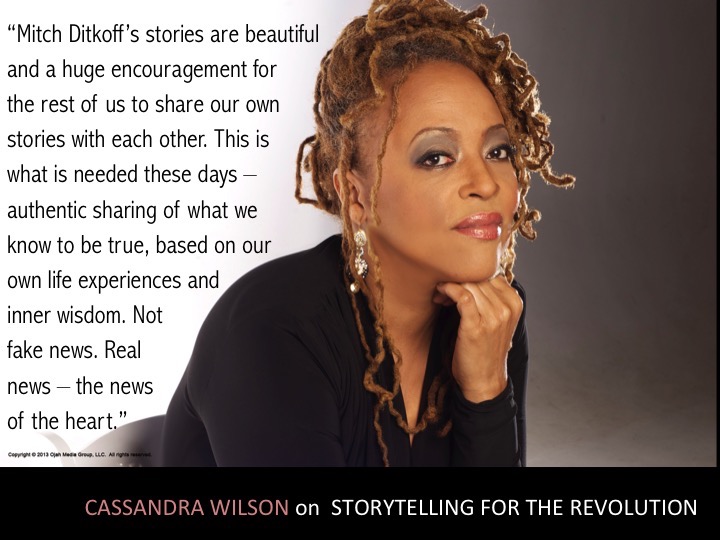

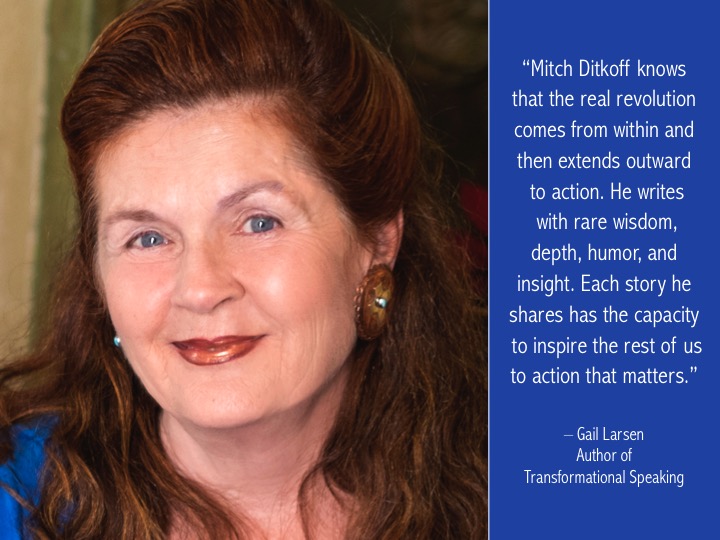

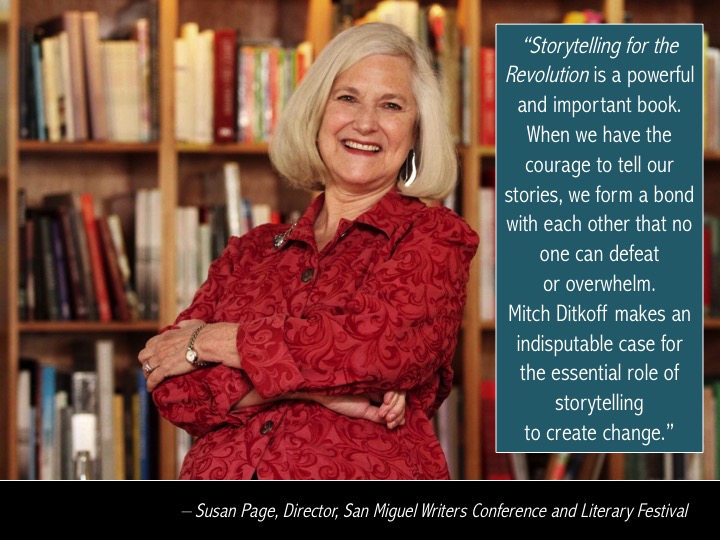

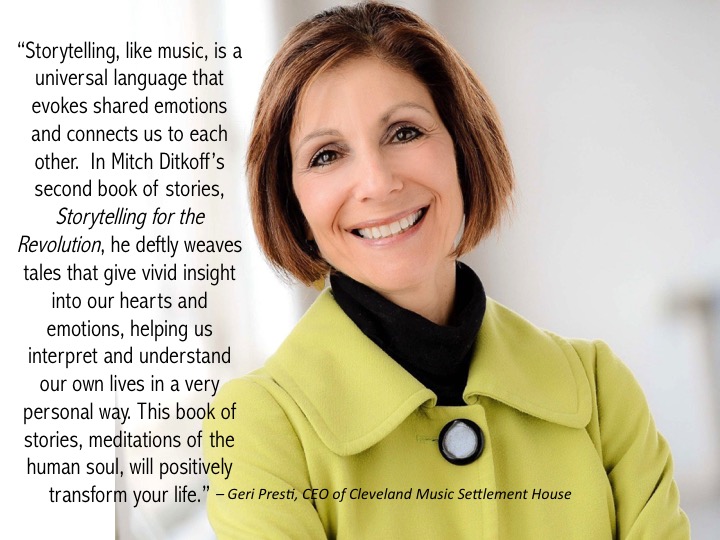
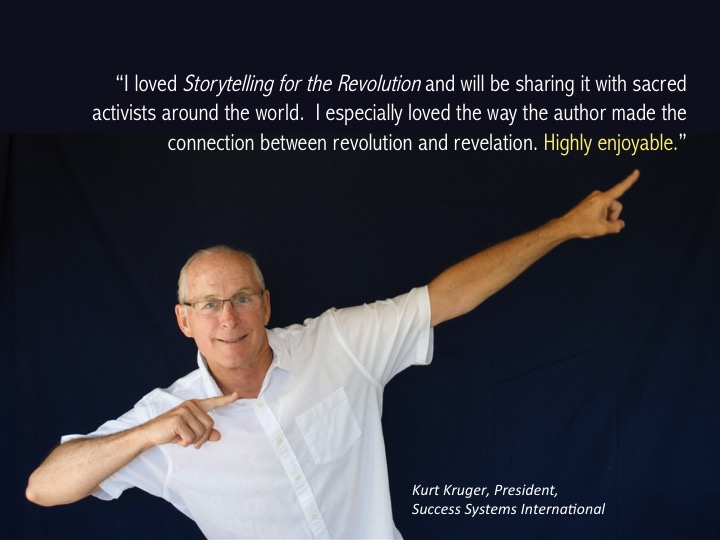



Storytelling for the Revolution
Storytelling at Work
MitchDitkoff.com
Posted by Mitch Ditkoff at 11:44 PM | Comments (0)
March 05, 2019Are Your Stories Serving You?
Posted by Mitch Ditkoff at 08:43 AM | Comments (0)
August 24, 2018Cavemen with Briefcases Waiting for a Wise Story to Be Told
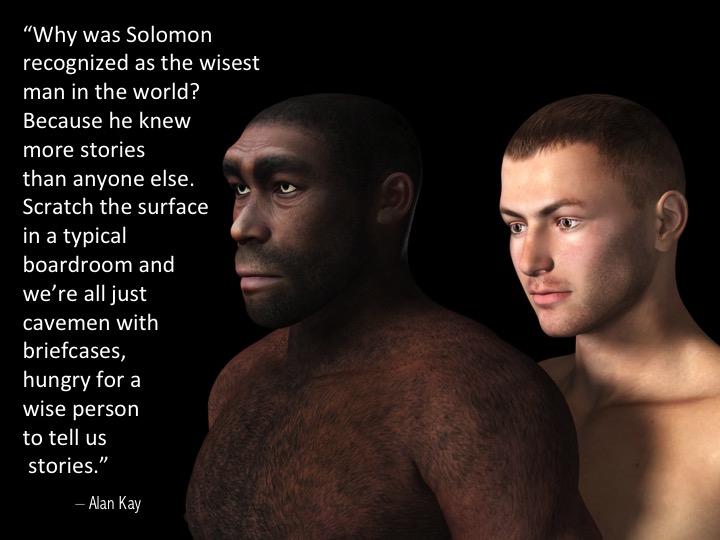
Storytelling at Work: The Workshop
Storytelling to Create the Innovation Mindset
Storytelling at Work: The Book
Storytelling in the Workplace: The Radio Interview
Posted by Mitch Ditkoff at 09:10 AM | Comments (0)
April 14, 2018KURT VONNEGUT SPEAKS: On the Shape of Stories
MitchDitkoff.com
The shape of stories in the workplace
Storytelling as a way to spark innovation
Posted by Mitch Ditkoff at 10:52 AM | Comments (0)
March 24, 2018The Power Over Story
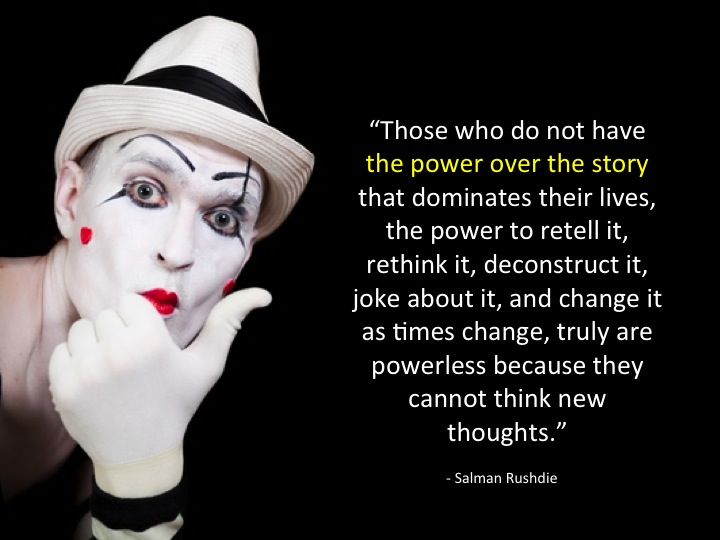
Amazon Reviews of Storytelling at Work
Posted by Mitch Ditkoff at 02:10 AM | Comments (0)
January 18, 2018Alan Rickman on Storytelling
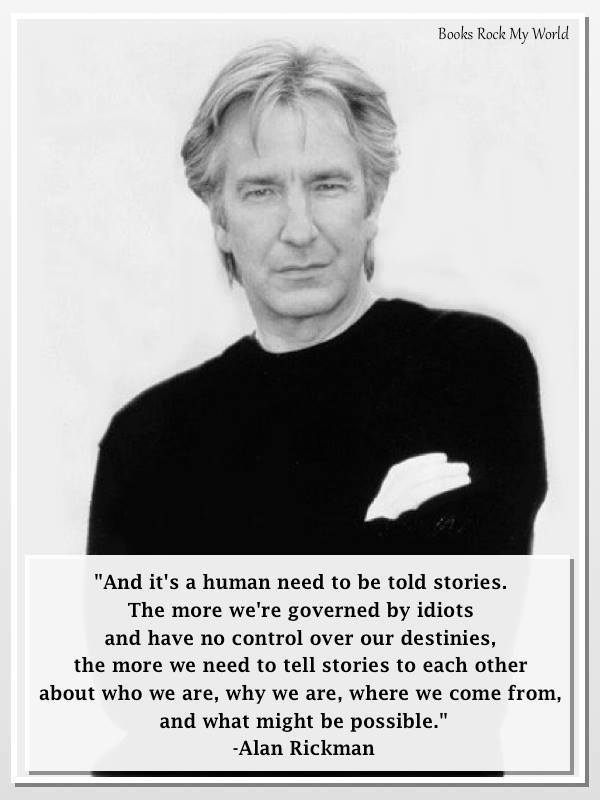
Exhibit "A"
Storytelling for the Revolution
Workshop: Innovation and Storytelling
MitchDitkoff.com
Posted by Mitch Ditkoff at 03:30 PM | Comments (0)
January 06, 2018How Your Process of Creating Stories Can Be More Creative

So... you want to write or tell stories? Fantastic. But how can you ensure that your writing or telling is as creative as possible and not just the "same old, same old?" What follows is a list of 20 tips to keep you operating at the highest octave of your creative potential:
1. Identify what blocks your creativity: When Michelangelo was asked how he made his iconic statue, The David, he explained, "I simply took away everything that wasn't." From his point of view, the statue was already in the stone. All he had to do was remove what obscured it. What is in your way of telling or writing your stories? What can you do, this week, to remove this clutter?
2. Immerse: Creative people have a unique ability to dive in and stay with a project for long stretches of time. They don't just hit and run. Instead, they get absorbed. That's why Einstein once said, "It's not that I'm so smart. It's just that I stay with problems longer." How can you make more time to really dive into your storytelling project?
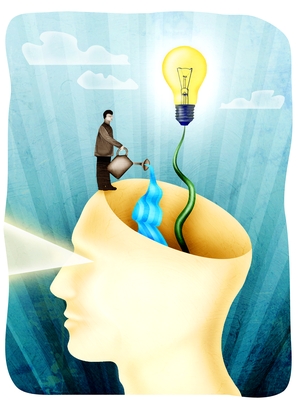
3. Reframe failure: Creative people are less afraid of making mistakes than most people. They understand that many experiments are needed and that trial and error comes with the territory. When Thomas Edison was asked how it felt to fail 800 times before coming up with tungsten as the filament for the light bulb, his reply said it all: "Fail? I didn't fail once. I learned 800 times, what didn't work." How can you create more "storytelling experiments" in your life?
4. Go beyond your limiting assumptions: Often, the suppositions we make at the beginning of a project are completely bogus -- a strange concoction of our past experiences, false beliefs, and personal myths. Innovators have a knack for being less bound by limiting assumptions than most people. Their state of open-mindedness allows them to explore bold, new territories. What is your biggest limiting assumption about being a storyteller? What can you do to go beyond it?
5. Stay inspired: I know of very few depressed or despondent people who are consistently creative. And while it's true, that creative people can sometimes get depressed or despondent, they don't stay in that space for very long, realizing that a positive mindset is one of the keys to their success. What is the simplest way you can stay inspired as you proceed with your storytelling project?
6. Ask WHAT IF: Asking powerful questions is a great way to enter into a creative mindset, one that is infused with curiosity. And of all the questions you can ask, asking "What if?" is the most powerful. What if you weren't afraid to fail? How would that affect the choices before you? What are three other "what if" questions you might ask yourself?

7. Make connections between seemingly disparate elements: One of the qualities of a creative thinker is the ability to synthesize -- to see new relationships between this, that and the other thing. MTV, for example, is nothing more than the result of someone seeing a new connection between music and television. Drive-in banking? A new connection between cars and banks. What new connections can you make between seemingly unrelated elements of your project? List all the elements of it, then look for intriguing new connections between them.
8. See through others' eyes: One of the biggest obstacles to creativity is our odd little habit of viewing everything through our own eyes/lenses/filters. Addicted to our own point of view, we develop a weird kind of tunnel vision. The simplest way to free your self from this constraint is to look at your storytelling project through the eyes of someone else. How would Mohammed proceed if he was in charge? Rosa Parks? Richard Branson? Lady Gaga? What clues about proceeding do get from their approaches?
9. Pay attention to your subconscious mind: Ideas come to us from two places: the conscious mind (i.e. brainstorming, thinking, planning) and the subconscious mind (i.e. dreaming, intuition). Most great ideas seem to come to people from the subconscious mind, when they are taking a break from the problem at hand and not trying so hard. Where and when do your best ideas come to you? How can you honor these ideas more than you currently do?
10. Suspend logic and linearity: Most of us are rational beings. Our default condition is logic and linearity. But there is another part of us, too -- the free thinker, the dreamer, the one who likes to play with possibilities, often called "right brain thinking". How can you suspend your tendency to allow logic and linearity to dominate your life? How can you make more time to play around with possibilities?
11. Trust your instincts, intuitions, and hunches: Albert Einstein once said, "Not everything that counts can be counted; and not everything that can be counted, counts." Indeed, when he got stuck, he used to conduct what he called "thought experiments", a fancy name for daydreaming. Bottom line, he trusted his hunches more than most of us do. What are your instincts and intuitions telling you about your emerging storytelling project?
12. Entertain the fantastic: Gary Kasparov, the former Soviet Union Grand Chess Master, had the ability to strategize 26 moves ahead. But when, in 1989, he was asked what enabled him to beat Big Blue, IBM's mainframe computer, in a two game chess match, he attributed his success to "the ability to fantasize". Einstein, too, was a big proponent of fantasizing and once said "the ability to fantasize has meant more to me than my ability to absorb positive knowledge." How can you make more time, in your life, for blue sky thinking?
13. Collaborate: Some people assume that creativity is the result of a lone wolf genius inhabiting an ivory tower and returning to the "marketplace" with a brilliant breakthrough. And while this sometimes happens, it is mostly a myth. Often, creativity is sparked by being in relationship with other people -- jamming, brainstorming, and playing around with new ideas. How can you increase the amount of creative collaboration in your life? Who, specifically, can you invite to be one of your collaborators?
14. Have more fun: This just in! "Aha" and "Haha" are very much related. In the aha moment, the person with the insight ends up surprised about a given outcome. He/she is "dislocated" from their common assumptions, i.e. Archimedes in the bathtub. The haha moment is similar. Indeed, the reason why most of us laugh is because our expectations get disrupted. Creativity and humor are joined at the hip. Get too serious and you diminish the odds of creativity flourishing. In what ways can you infuse your creative process with more playfulness and humor?
15. Look for happy accidents: Do you know what penicillin, Post-It Notes, and Velcro have in common? They were all the results of accidents in the lab. None of them were the result of a brainstorming session or strategic plan. But instead of being dismissed as mistakes, the innovators associated with these discoveries, got curious. They played around with these unanticipated occurrences until they discovered their commercial value. Indeed, research indicates that 75% of all product and service breakthroughs are the results of serendipity, surprise, and happy accidents. What curious insights have you stumbled upon recently that the logical part of your mind may have dismissed as inconsequential?
16. Change environments: Sometimes, the simplest way to spark creativity is to change environments. Socrates knew this. That's why he invented his "Peripatetic School of Education" -- a way to get his students to walk the talk. This is why so many of us get our best ideas during or after exercising. Where can you go to refresh and renew yourself whenever you are feeling stuck?
17. Be comfortable with ambiguity: Creating something new is not a function of a predictable, sequential process. It often requires lots of time spent not knowing or being confused. Ambiguity comes with the territory. If you are not mindful of this phenomenon, you will likely grab onto the "first right idea" to settle yourself down. This is not a good idea. In what ways can you give yourself more permission to be uncomfortable as you proceed with your storytelling project?

18. Acknowledge your progress: Creating something new is often frustrating. Results don't always come quickly. Consequently, aspiring innovators tend to get discouraged and enter into a cranky mindset. Inspiration, optimism, and positivity go out the window. The simplest way to neutralize this phenomenon is to take a few minutes at the end of each day to acknowledge the progress you have made, no matter how small. Think about your emerging storytelling project. What progress have you made on it today? This week? This month?
19. Give and receive feedback: Often, aspiring innovators are on the right track, but their addiction to "being right" gets in the way. What they need to do in order to open up their creativity is get feedback from people they trust. Unfortunately, this happens infrequently. All too often, we interpret feedback as criticism, so we don't ask for it. In what ways can you get more feedback about your storytelling telling project? Who can you ask today?
20. Honor your polarities: People who want to be more creative, would love there to be some kind of blueprint or map. Guess what? There isn't And even if there was, it would include lots of contradictory directions. That's because the act of "being creative" is often a contradictory process, which is why Niels Bohr, the Nobel-prize winning physicist, once said: "Now that we have met with paradox, we have some hope of making progress." The creative process is not an either/or phenomenon. It is both. Which of the following polarities do you toggle back and forth between?
-- Patience/impatience
-- Solitude/collaboration
-- Urgency/relaxation
-- Seriousness/playfulness
-- Divergence/convergence
What other polarities do you experience in your creative process? What can you do to honor them more than you currently do?
Excerpted from my forthcoming book, to be published in May.
MitchDitkoff.com
My storytelling workshop
Posted by Mitch Ditkoff at 10:15 AM | Comments (0)
December 07, 2017The Elevator Speech

In the past few weeks, quite a few people have asked me for the "elevator speech" about my book. I get it. These days, if you can't deliver your message in 60 seconds or less you're screwed. So here goes. Consider this my elevator speech (though the building you are riding in is a hundred stories high).
I wrote Storytelling at Work because I wanted to do everything in my power to unleash what I have come to realize is one of the biggest untapped resources on planet Earth -- and that is the collective insight and wisdom of human beings everywhere. No matter what our education, culture, or profession, each of us has a storehouse of brilliance inside of us -- a deep knowing (hiding in our stories) that, when expressed, has the power to uplift, inspire, and transform.
I'm not talking about the rote communication of book learning. Nor am I talking about the transmission of data, facts, and information. I'm talking about the communication of the very best of what human beings have to share with each other.

Look at it this way: If you want to transport water to a thirsty person, you need a container -- a cup, a bottle, or canteen. If you want to transport wisdom, you also need a container. And the best, most available, container we have is story.
This wisdom conveyance phenomenon has been going on since the beginning of time. It's how our species is wired. It started with cave paintings. It continued around the tribal fire. And it eventually found its way into the wisdom teachings of every civilization on earth.
In modern day business, this storytelling phenomenon has morphed into various, more commercialized forms, all considered to be ways of furthering an organization's success -- branding, advertising campaigns, leadership pep talks, and the sharing of "best practices."
Fine. No problem. But what I'm inviting people to share is not just new ways to sell products, convince others to work harder, or "continuously improve". I'm inviting people to dig deeper and share their "tacit knowledge" with each other -- the harder to express stuff about what they've really learned about themselves, life, and what it means to be a human being -- on or off the job. The juicy stuff. About adaptability. About resilience. About risk taking, courage, creativity, trust, failure, perseverance, passion, intuition, humor, commitment and whatever else they've experienced that is truly meaningful to them.
Without the expression of this wisdom, work can never be more than a job and life can never be more than thanking God for Friday.
Awesome quotes on storytelling
Why your brain likes a good story
Storytelling as a strategic business tool
Why my book matters + excerpts
The shortest elevator speech ever (book excerpt)
Posted by Mitch Ditkoff at 03:32 PM | Comments (0)
October 07, 2017THE WISDOM REVOLUTION: The Text of My 2018 TED TALK
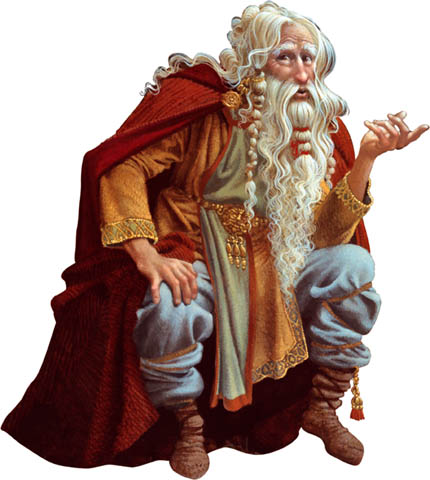 I stand before you tonight for one purpose and one purpose only -- to launch a revolution. Not the kind that overthrows a government. Not the kind that replaces one political system with another. And not the kind that takes life. No. The revolution I am launching gives life -- a revolution of wisdom or, better yet, a revelation of wisdom -- a way that each and everyone of us can change things for the better on planet Earth.
I stand before you tonight for one purpose and one purpose only -- to launch a revolution. Not the kind that overthrows a government. Not the kind that replaces one political system with another. And not the kind that takes life. No. The revolution I am launching gives life -- a revolution of wisdom or, better yet, a revelation of wisdom -- a way that each and everyone of us can change things for the better on planet Earth.
My weapon of choice? Not a gun. Not a hand grenade. Not a bomb. My weapon of choice is a story. Yes, you heard that right -- a story.
Most revolutionaries have a manifesto -- a strongly worded statement of their purpose. I have one, too, but you won't need to write it down to remember it. My manifesto is already encoded in your cells. It lives inside you and always has. Like the neuroscientists like to say, "the human brain is wired for story". We are storytelling animals -- going all the back to our tribal ancestors standing around the fire and telling their stories of the day.
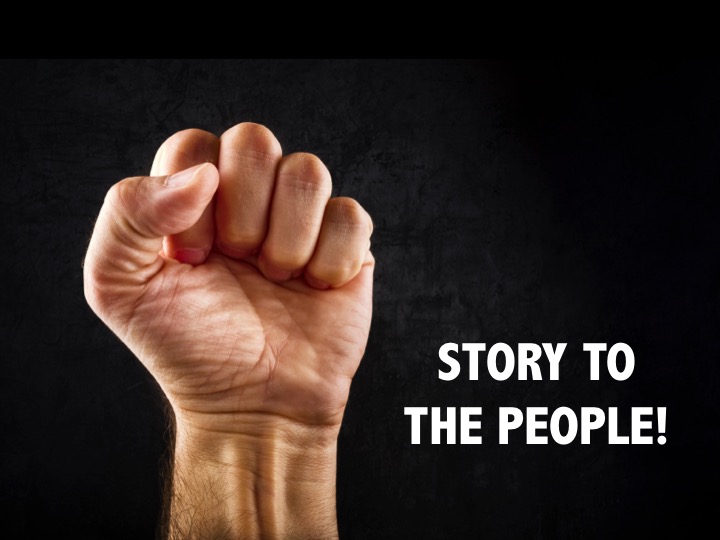
No matter what our differences, there is one thing we all share in common: We all belong to the same species -- "homo sapiens" -- the Latin term for "wise person".
Yes, we all know something. We do. Our challenge? How do we communicate what we know to each other? That's the real question. Because once we do, things will begin changing for the better.
Steve Jobs may have said it best. "The most powerful person in the world is the storyteller. The storyteller sets the values, mission, and agenda of an entire generation that is yet to come."
And Steve is in excellent company. According to the Hopi Indians: "He that tells the story rules the world".
Powerful words, but what do they really mean? Well, instead of talking about story to make my point, allow me to actually tell you a story.
Once upon a time, there was a wealthy merchant traveling across India on a month-long buying trip -- a journey he made twice a year, going to off-the-beaten-path villages to buy the finest of silks and brocades.
Two days into his journey, while dining at a roadside hotel, the merchant was approached by a young man.
"Oh merchant," the young lad began. "You are old and I am young. You are frail and I am strong. Allow me to assist you, to carry what needs to be carried. Your journey will be more successful and I will get a chance to earn a much needed living."
And so the merchant hired him on the spot. Each night the two of them dined together on the finest of foods and each night, about 20 minutes into the meal, the young man would politely excuse himself -- not to use the bathroom or go for a walk -- but to search the merchant's room, looking for money to steal. Alas, he never found a single penny. Then, on the final night of the journey, racked with guilt and a big dose of curiosity, the thief confessed.
"Kind sir, ever since we met I have had only one thing in mind -- to rob you. Each night I searched your room, looking under your pillow and everywhere else, but I never found your money. Your kindness has humbled me and now all I can do now is ask your forgiveness. But before we go our separate ways, I must ask one thing: Where did you hide your money?"
"Ah..." replied the merchant. "I knew from the moment we met that you were a thief. That was obvious. So I hid my money in the only place I knew you wouldn't look. I hid my money under your pillow."
The riches I'm talking about tonight is not gold, stock options, or the almighty buck. I'm talking about what money cannot buy. Insight. Understanding. Meaning. And the highest expression of all: Wisdom. Inside of each of us there is great wisdom -- an intuitive knowing of something beyond space and time. But like the merchant's fortune, it is hiding. Where is it hiding? Under our pillow. And the pillow is story.
How does a person experience wisdom in the first place -- something actually worthy of communicating? There are many ways. Some people read holy books. Some meditate. Some are initiated into it by a Wise Teacher or Master. And for some, wisdom simply comes with time. But no matter how we get our first taste of it, the challenge, eventually, is how do we communicate what we know to others?
Deconstruct any scripture, any sermon, any TED talk and you will find story! That's how most meaningful messages are conveyed. Indeed, social scientists tell us that 65% of all human conversations are made up of story -- either narrative accounts of what's happened in the past or our imaginings of what we'd like to see happen in the future.
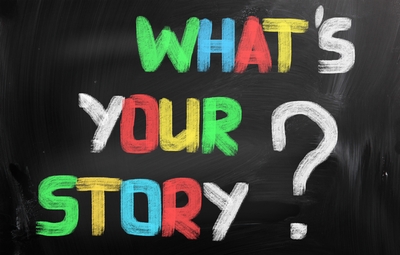
Story is everywhere. As author, Madeleine D'Engle, noted: "There are entire societies that have never used the wheel. But there are no societies that did not tell stories." Other than breath, story may be the single most common denominator we all share in common.
Here's what the neuroscientists tell us: When a storyteller shares their experience, the same parts of the brain light up in the listener as lit up in the storyteller's brain upon first having the experience they are sharing. "Mood contagion" it is sometimes called. "Somatic states". "Neural coupling" -- the phenomenon of one person being able to transmit not only information about X, Y, or Z, but a feeling imbued with the power to spark transformation. "Mind Meld" as Dr. Spock would have called it -- how one person transmits hard-to-communicate "tacit knowledge" to another.
The question isn't whether or not storytelling works. It does. The question is: Are we going to step up and tell our stories?" And, equally as important, What kind of stories are we going to tell?
Storytelling, you see, is like a knife. You can use it to spread butter on toast or you can use it to poke somebody's eye out. Sages, rabbis, priests, elders, teachers, and light-bearing people of all kinds use story to communicate meaningful, memorable messages -- timeless truths and principles. That's the good news. But there's also a dark side to storytelling. It can be used to manipulate and control. Think political spin doctors. Think revisionist history. Think advertising at its worst.
If you really want to witness the power of story to color our collective mindset, all you need to do is watch the evening news. The stories the media likes to tell? Stories of violence, corruption, war, greed, rape, murder, bombings, terrorism, fraud, fires, and scandal -- with an occasional cat being rescued from a tree just so we don't just all jump off a bridge and screw up their ratings.
90% of all nightly news stories are negative. I get it. Bad news sells. I get that there's a lot of "bad stuff" going on in the world and knowing about it is the first step toward doing something about it. Please don't get me wrong. I'm not advocating that we airbrush the bad news from our lives. Even Fairy Tales have "bad news" -- the monster, the demon, and the Big Bad Wolf.
True. But how about we strike more of a balance? What if each and everyone of us chose to share more of the good stories with each other -- not just on Sundays, but everyday -- stories of breakthrough, learning, insight, and kindness -- stories that inspire, awaken, and yes, spark wisdom.
What would happen if we elevated the conversation -- one story at a time on this big, beautiful planet of ours?
Because what we say, what we express, what we put out there in the world is not just about reporting on so-called reality. It's also about shaping reality. Like one novelist put it, "People think human beings create stories. In fact, it's the other way around."
And all of this begins with you and me. Not our so-called leaders. Not the government. Not the movie makers, novelists, and programmers -- though they can certainly help. It begins with us.
I'm sure you've heart the expression "Power to the People?" Yes? And I'm sure you've heard the expression "Information is Power?" Yes? Well... what I'm saying is that if you want to be informed about what really matters, if you want reclaim your power, then get on the front lines of storytelling.
You may not own CNN, FOX News or NBC, but you are in the broadcasting business. You are your own news station. You get to program the kind of news that goes out into the world.
In 1993, a group of 4,000 meditators in Washington DC, over the course of two months, demonstrated that crime could be reduced in the U.S. capital -- in their case, by 23%, simply by meditating. (Before this experiment, the DC chief of police claimed that the only way crime could be reduced by 20% was if there was 20 inches of snow!)
I can't tell you how that mass meditation experiment worked (fans of Rupert Sheldrake might explain it as the "morphogenetic field.") All I know is that it worked. What if all 7.8 billion of us began telling wisdom stories? What might change? How might the conversations we are having shape our reality?
Here's an example from my own life.

Some years ago, I was hired by a large food manufacturer to facilitate a brainstorming session to help them invent a new kind of salty snack food. On the morning of the session, my day began like any other day. I woke up. I showered, shaved, dressed, picked up a USA Today from the lobby and got into a cab. Glancing at my driver's photo and name on the dashboard, it was clear to me he was not from this country. The spelling of his name seemed odd. It has many consonants in a row, kind of like someone had put a bunch of scrabble tiles in a bag, shook them, and randomly pulled them out. At that moment, I had a choice, I could have napped, read the paper, or checked my email. Or I could have started a conversation with him -- a risky proposition, as many foreign cabbies, in my experience, especially ones who worked the early shift, didn't seem to like Americans.
Screw it. I spoke.
"Where are you from?" I asked.
"Afghanistan", he replied -- a piece of information that stopped me dead in my tracks, America being smack in the middle of that horrendous war. Yes, that could have been the end of the story, but I decided to ask him how it was he came to live in America.
There was long, silent, pause, and then he spoke.
You see, he was out for a walk with his daughter, one day, in a field outside of his village when his daughter stepped on a landmine. So he ripped off his shirt and made a tourniquet to stop the bleeding. Then, with his daughter on his back, he went madly in search of a doctor. But there were no doctors. Villagers took him and his daughter in, applying home made remedies to her mangled leg, but his daughter was rapidly losing it, drifting in and out of consciousness. Then, one of the villagers told him of an outpost of nurses from the Mayo Clinic not far away. He got there and collapsed. They tended to his daughter, kept her alive, and flew her Minneapolis for surgery. Then they flew him and his wife to join their daughter as she went through more surgeries, the fitting or a prosthetic leg, and major rehabilitation. They decided to stay in America. Eventually, he got a job as a cab driver and I was now in his back seat.
You know they expression "worlds collide?" Well.. I was in the epicenter of it.
When we finally got to my client's headquarters, my driver and I both got out of the cab. I paid him. Then we hugged. No words were spoken. As I got into the elevator, I knew I had a choice to make. Do I begin my session with a traditional icebreaker or do I start with the story of my journey from hotel to headquarters? It wasn't a difficult choice to make. As Maya Angelou said, "There is no agony like bearing an untold story inside of you".
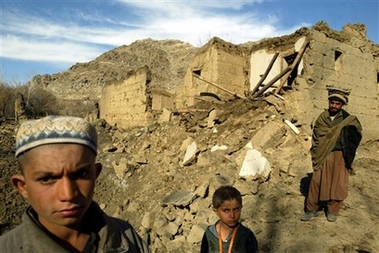
So I opened the meeting with my Afghani cab driver story. And while I was sure I needed to tell it, I wasn't sure how the people in the room would react. It could have bombed. They could have looked at me, cross-eyed. But they didn't. Their eyes didn't cross. They opened. So did their minds. And so did something they all-too-rarely bring to work -- their hearts. My little story had a profound effect of them. Peter Guber, author of Tell To Win, refers to this as "emotional transportation".
This is the kind of revolution I'm talking about, folks -- the revolution of feeling... the revolution of perspective... the revolution of wisdom shared via the medium of story.
Indeed, a single story has the power to change mood, change minds, and change what's possible. My life changed in the telling of that story. And theirs did, too. There was a revolution in the room. You could feel it. With the telling of my Afghani cab driver story the people in the room were now revolving around something much bigger than before the story was told. A new kind of orbit was born.
Every day, when a friend passes you on the street and asks "Whassup?", you have the same choice I did. You can talk about your aching back, the weather, and the latest scandal, or you can elevate the conversation by telling a story that matters. I'm not suggesting you enter into some kind of long-winded monologue or try to convince your friend of something. No. Many stories can be told in 90 seconds or less and the good ones deliver the message without the teller having to evangelize.
As Hannah Arendt once said, "Story reveals meaning without committing the error of defining it."
I've told two kinds of story tonight. The first one, the story of the merchant, is known as a Springboard Story -- the kind of classic tale that has, embedded within it, a universal message. Every tradition has them. Sufi stories. Zen stories. Stories told by Hasidic rabbis. Stories from the Bible. Or any number of Fairy Tales. This is how all of the great sages, teachers, and masters teach and this is how we can teach each other.
The second story I told tonight -- the Afghani cab driver story -- was a personal story. I didn't read it in a book. I lived it But equally important, I told it. I shared it. I got it out of my head and into the world. I took that knife and spread some butter on your toast.
You, too, have stories to tell. I know you do. Some of them may be of the Springboard story variety. But you also have your own, personal stories to tell -- your own spontaneously occurring "moments of truth" -- an obstacle overcome... a lesson learned... a breakthrough... a rite of passage... a random act of kindness. All of us have these experiences. Every single one of us. And they have great power. But only if they are shared.
You may, like many people, think you are not a good storyteller. You may think people won't listen or you will bore people. Not true! You are already a good storyteller. You've been telling stories all your life. It's what psychologists call an "unconscious competency". Like breathing. Or thinking. Or riding a bike. You may not be able to explain how you do it, but you know how. You do. You're a natural. It's in your bones.
So this is my invitation to you: Join the storytelling revolution. Step up to the plate and let it rip! Don't just evolve. Revolve! Revolve around a much bigger sun than bad news, gossip, and complaint. Liberate the storyteller within. As one pundit put it: "The role of the storyteller is to awaken the storyteller in others."
This has been my job tonight. But it's your job, too -- that is IF you want to change the collective narrative that shapes our lives.
How to begin? It's simple. In this moment, think of a story you have heard that inspires you -- maybe something a friend told you or a grandparent, or a teacher, or someone you sat next to on a plane. Or maybe no one told you. Maybe you read it a book -- a story that, like a beautiful piece of music, you never get tired of hearing. Got it? Good.
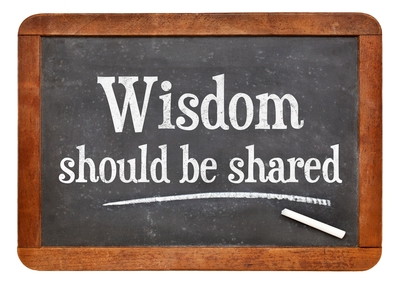
The second kind of story I want you to remember is one of your own -- something that happened to you -- a memorable moment... a challenge overcome.. a lesson learned... almost dying... falling in love... the birth of a child... a chance encounter... like what happened to me in the back seat of the cab. Got it? Good.
Now, oh comrades of the newly forming Storytelling Revolution, if you are willing to share your story with someone in the next few days, I invite you to stand up. Go ahead, take a stand for story. Are you with me?
Cool. Stay standing.
You may be wondering how to begin. It's easy. There is only one sentence you need, one segue, to get the ball rolling when you're in a conversation. And it is this: "That reminds me of a story". As long as you are listening and the story you tell connects in some way to the conversation you're in, you are on your way.
And when you're done, give the person you're talking to the gift of your attention. Give them space to respond. Don't just hit and run now that your story has been told. Stay in the space your story opened up. Perhaps your story will remind them of a story they want to tell. And relax. You won't need lot of time for this. Just a few minutes is enough. After all, you'll watch the evening new for 30 minutes at a clip. All I'm asking for is ten. And with the other 20 minutes you will have saved? Have some fun. Or walk the dog. Or read my book.
In the revolution I'm inviting you to join, we're all on the front line -- the line called NOW. No one is injured. Everyone is healed. No one is killed. Everyone lives. Lives! Not just survives! LIVES -- and experiences what it truly means to be conscious, awake, and an active member of the world community of wise ones.
You in? That's my story and I'm sticking to it.
NOTE: My TED talk has not yet been given. Telling you the story of my future TED talk is my next step in creating it. Intention matters. Words matter. The stories we tell ourselves matter. Stay tuned!
Storytelling is the Trojan Horse of Wisdom
The Secret Code of Tacit Knowledge
Why Tell Stories?
What Kind of Stories Will You Tell Today?
The Art of Using Story to Communicate Big Ideas
Real Moments of Truth on the Job
My Podcasts, Videos, and Interviews on Storytelling
Storytelling at Work: My New Book
Posted by Mitch Ditkoff at 11:02 AM | Comments (1)
August 09, 2017The Four Healing Salves
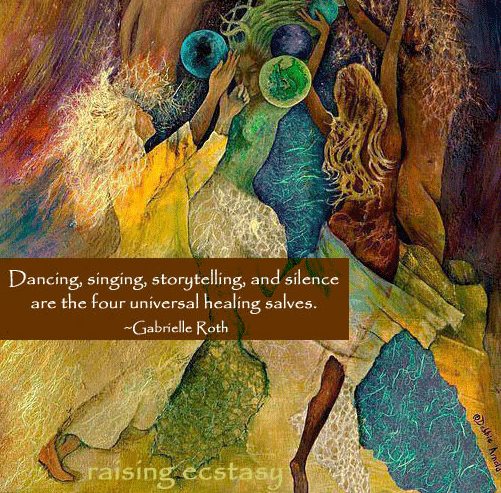
Posted by Mitch Ditkoff at 09:01 PM | Comments (0)
June 14, 2017The Afghani Cab Driver and the $250M Dollar Salty Snack Food
The story in the Huffington Post
13 of my video stories on GlowDec
Podcast, interviews, and storytelling links
Who I am in the marketplace
Posted by Mitch Ditkoff at 02:12 PM | Comments (0)
May 11, 2017How Top Companies Use Storytelling to Drive Results
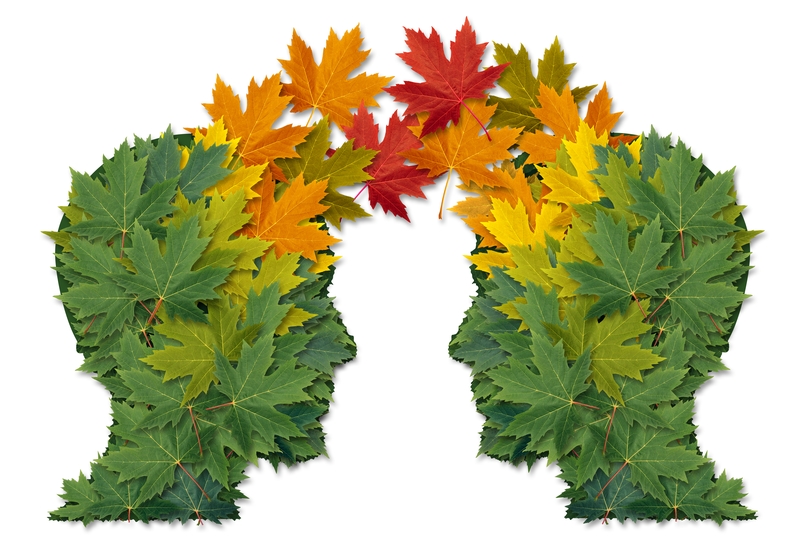
A well-written article, from Inside HR, on the power of storytelling in organizations. A 3-minute read.
One size does not fit all
MitchDitkoff.com
My storytelling workshop
Posted by Mitch Ditkoff at 03:15 PM | Comments (0)
May 08, 2017CUSTOMIZED WORKSHOPS: One Size Does Not Fit All

If you are looking for a simple way to leverage the power of storytelling in your organization, but haven't found an "off the shelf" solution, I know why: it doesn't exist. And WHY it doesn't exist is because your organization's needs are unique. One size fits all does not fit all. That's why Idea Champions' storytelling workshops are all customized. We mix and match from a broad selection of modules to create the perfect fit for you. All we need to know is what topics you'd like to see us address and in what ratio. Simple. And we don't charge for customization.
THE MODULES
-- Building a business case for the benefits of storytelling
-- Improving listening and feedback skills
-- Activating the innovation mindset
-- Sharing in-house best practices
-- Communicating tacit knowledge (i.e. insight and wisdom)
-- Going beyond your organization's old story
-- Generating new ideas and solutions
-- Increasing trust and teamwork
-- Improving idea selling skills
-- Inspiring action and meaningful follow through
-- Fostering a culture of storytelling in the workplace
TWO EXAMPLES:
Creating the Innovation Mindset
Storytelling at Work
OTHER RESOURCES FOR YOU
We wrote the book
We also wrote the blog
The workshop is taught by this gent
Posted by Mitch Ditkoff at 11:46 PM | Comments (0)
May 05, 2017Why Storytelling Matters
Some good stuff in this one about the structural elements of good storytelling.
Silver medal winner of the Axiom Book Awards
MitchDitkoff.com
Posted by Mitch Ditkoff at 10:36 PM | Comments (0)
May 03, 2017Pixar's 22 Rules of Storytelling
Storytelling in Business
Share tacit knowledge at work
WORKSHOP: How storytelling can spark the innovation mindset
Posted by Mitch Ditkoff at 01:05 PM | Comments (0)
May 01, 2017Why the Best Superbowl Ads Are Structured as Stories
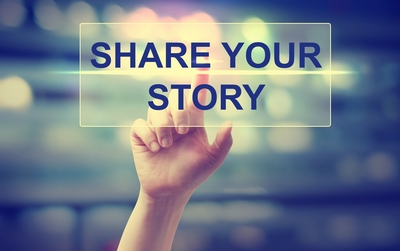
A two-year analysis of 108 Super Bowl commercials has revealed that it was the structure of the content -- not the content itself -- that was the biggest predictor of its success. And the structure that was most linked to Superbowl ad success? Stories. This Harvard Business Review article elaborates on why storytelling is such a powerful communication tool.
Storytelling at Work
Awesome quotes on storytelling
MitchDitkoff.com
Posted by Mitch Ditkoff at 08:21 AM | Comments (0)
April 30, 2017Tell Me a Story
This is a pearl of a TED talk by the co-founder of Story Engine. Deep, authentic, and entertaining. Worth watching twice. Great quote, at the end, by Fred Allen.
Posted by Mitch Ditkoff at 11:37 PM | Comments (0)
March 06, 2017Allow More Time to Be Creative
Writing a book? Preparing a storytelling performance? Working with kids? Coaching other people? Leading a team? If you want to crank up the creativity, allow more time for it to flourish!
Carl Jung chimes in
Idea Champions
Allow more time for storytelling!
Play time at AT&T
Posted by Mitch Ditkoff at 01:43 AM | Comments (0)
October 26, 2016You Are Never More Than a Minute Away from the Big Breakthrough
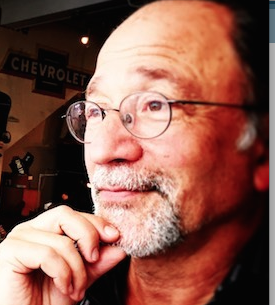
I want to tell you a brief story about 60 seconds of my life, nine years ago, that felt like an eternity -- an experience that was so totally infused with meaning that I am still drinking from it's fountain almost a decade later. Here goes:
The night before Prem Rawat's 50th birthday party event at the San Diego Convention Center, to be attended by 3,500 people, I was asked to be the MC. My response to this unexpected invitation? A curious blend of fascination and fear. Fascination that Prem had the confidence in me to do the job. And fear of totally screwing up. But since I barely had any time to prepare, I couldn't afford to indulge in the part of me that was freaking out. So I went to the dress rehearsal, studied the announcements, made sure my fly wasn't open, and got ready for the evening gig.

So there I am, backstage, waiting for my cue, when I am hit upside the head by the worst case of stage fright I imagine anyone, anywhere, anytime, has ever experienced. This, my friends, was well beyond anxiety or nervousness. STUCK. I was completely stuck. Frozen. Fried. Terrified. Totally in my head. I had never, in all my life, experienced such an all-encompassing sense of dread. I was the poster boy for UPTIGHT. Jonah in the belly of the whale. Mr. Weirdo. I was SO uptight, in fact, I soon found myself PRAYING for someone to call in a bomb scare or the building would catch on fire -- anything to GET ME OUT OF THERE!
Richie, the very laid back stage manager in charge of time and space, could see I was quietly freaking out, and so with just five minutes left before show time, he walked over to me and began giving me a shoulder massage -- a kind deed which only succeeded in MAKING THINGS WORSE, because now I knew, for sure, that my inner meltdown was so totally visible to the outside world that Richie, my handler, felt obliged to cool me out. Doo doo. I was in deep doo doo.
It was now only FIVE minutes before the program began and, though my body was sitting on a folding chair backstage, the rest of me was on Mars. No make that an ASTEROID -- a very small, rocky, cold asteroid orbiting absolutely nothing.
Now there were FOUR minutes to go. Now there were THREE. And there was absolutely no sign, anywhere, that my hyper state of out-of-control-self-consciousness was going to abate anytime soon. This was clearly going to be the end of me. In three minutes, everyone in the hall would know, for sure, that I was a complete idiot, a fraud and a buzzkill -- someone likely to become a future synonym for the phrase "consumed with terror" -- as in "Hey, don't pull a Ditkoff on me."
The clock was ticking. Now there was only ONE MINUTE left. One minute! And then... completely out of the blue... with no warning whatsoever, two things happened that I will never forget. Not in this lifetime. And not in the next. First, on the house PA system, I heard Daya singing my favorite song, Find the Miracle -- a song that always managed to bring me back to a place of complete ease. The second thing? Up from the depths of my being percolated the remembrance of something I heard Prem say many years ago -- something about the CHOICE we all have every single day of our lives.
"You can spend your entire life gritting your teeth and praying for it all to be over," he said... "or you can just say YES!"
Wow! Incredible! Amazing! I HAD A CHOICE! I could sit there in the wings, a complete and total mess -- or I... could... EMBRACE the moment and say YES to whatever was going to happen next. So simple! So, so, utterly simple. A choice! I had a choice!
That's precisely the moment I said YES. And that's precisely the moment when Richie stepped forward, leaned closer, put his hand on my shoulder, and said these words: "Three.. Two... One... Go!"
I stood. I took a breath. I boldly walked on stage. This wasn't the plank I was walking. This was my life! FREE! I WAS FREE! Completely free! Unshackled. Unhindered. And uncontainable! Nothing was holding me back. Nothing! Every ounce of who I was had become totally available to me. Everything! Whatever I needed in that timeless moment to play my part fully was fully present and accounted for. And the FEELING behind it all was pure JOY! The rest of my MC experience for the next two days was a total breeze...
Now I finally understand what the expression "the darkest hour is just before dawn" really means. Tell me, who of us doesn't battle with doubt, fear, and self-consciousness? Who doesn't want to run and hide when the going gets tough? Though it may not be how we want the world to see us, it comes with the territory of being human. Not just YOU. And not just ME. All of us! But more powerful than fear is REMEMBRANCE and the deep KNOWLEDGE that we have everything we need to play our part fully in any situation. We may not feel it all the time. We may not trust it. But it's there. It is. In the end, it all comes down to CHOICE. We can grit our teeth and pray it will all end. Or we can just say YES. What do you choose?
TimelessToday
Words of Peace Global
PremRawat.com
Posted by Mitch Ditkoff at 04:41 PM | Comments (1)
May 12, 2016CREATING THE INNOVATION MINDSET: A Storytelling Workshop

All business leaders worth their low-salt lunch, regardless of their industry, will agree on one thing -- that innovation a key driver of their company's success. What they don't agree on is how to ensure that innovation actually happens. Lots of time and resources are invested in sending out surveys, re-engineering processes, inventing new reward systems, and giving pep talks, but all-too-often nothing changes. Why not? Because most business leaders rarely get down to the root cause -- the innovation mindset of their workforce.
Bottom line, organizations don't innovate, people innovate -- inspired, curious, creative, and collaborative people. If you want more innovation, that's the place to focus on.

After 27 years of providing innovation services to some the world's most forward thinking organizations, Mitch Ditkoff, Co-Founder of Idea Champions. has discovered the holy grail of moving the "innovation needle". Storytelling. Yes, storytelling -- the skillful communication of personal narratives that change mindset, increase engagement, transfer knowledge, and spark commitment. Archimedes once said that if he had a lever long enough and a fulcrum to place it he could move the world. In the realm of innovation, storytelling is the fulcrum.
TOPICS ADDRESSED IN THE WORKSHOP:
-- Why storytelling is a powerful way to communicate on-the-job
-- How an organization's "old stories" constrain innovation
-- How to use storytelling to make meetings more effective
-- The 20 leading indicators of a corporate innovator
-- Using storytelling to increase employee engagement
-- How storytelling accelerates the sharing of insight and best practices
-- Identifying stories worth telling
-- How to communicate stories that spark innovation
-- The art and science of creating a culture of storytelling
-- Using storytelling to communicate bold, new ideas
-- Creating a new story of your organization's future
-- How to design and facilitate "Story Slams" in the workplace
Storytelling at Work
VoiceAmerica radio interview with Mitch
Storytelling podcasts, interviews, and articles
Posted by Mitch Ditkoff at 10:44 AM | Comments (0)


